Part 2 Tragedy in Istanbul - Results
and table 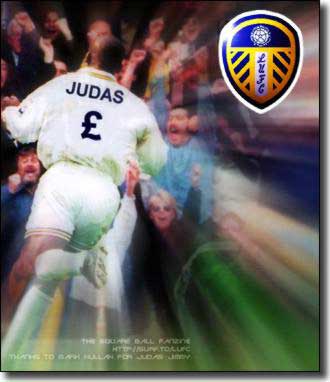
David O'Leary had taken over from his mentor George Graham as Leeds United
manager towards the end of 1998 as the Scot accepted the job of reviving
Tottenham Hotspur. The Irishman had made a good start to his time in the
role, blooding a batch of superbly gifted youngsters and still guiding
the team through to a fourth place finish and qualification for the UEFA
Cup.
As he entered his first close season at the helm, O'Leary was faced with
a much busier time of things than he had anticipated, with the main challenge
being to try and persuade marksman supreme Jimmy Floyd Hasselbaink to
sign up for an extension on his contract.
The Dutchman had been the club's leading scorer in each of his two seasons
at Elland Road and settled in well to life in the Premiership after a
sticky time of things earlier on. Graham had brought him to England in
1997 and his departure had clearly unsettled the striker.
Negotiations had been in progress since the spring and came to a head
at the end of July as Hasselbaink handed in a written transfer request.
He had been offered a new four-year contract which would have made him
the highest paid player at the club, but had held out for a rise which
would have seen him earning half as much again as any of the squad, in
excess of £30,000 per week.
O'Leary and chairman Peter Ridsdale were reluctant to disrupt the amazing
team spirit which had built up among a young squad during O'Leary's short
time in charge and the club would not be held to ransom.
'The club cannot do any more, It's up to Jimmy,' said O'Leary. 'What
he is looking for I don't think any club in the country could afford and
I don't think there is anyone on that kind of money over here.'
Within a week, on the eve of the new season, Leeds had accepted a club
record fee of £12m from Spanish club Atletico Madrid and Hasselbaink was
on his way to a new life in Europe, insisting despite the move that he
loved Leeds United, the supporters and always wanted to stay with the
club he joined two years before.
O'Leary had other bitter disappointments that summer when Ipswich Town's
exciting young midfielder Kieron Dyer opted to join Newcastle instead
of Leeds, and then missed out on the signing of Dutchman Willem Korsten
who had been on loan at Leeds for the second half of 1998/99. George Graham
had intervened and persuaded Korsten that life at White Hart Lane would
be a better bet and the affair caused a long running rift between the
two men who had enjoyed such success together at Highbury in the late
80's and early 90's.
Sunderland's young forward Michael Bridges had also looked like opting
for Tottenham rather than West Yorkshire when he went for discussions
in London, but in the end he settled for Leeds and joined the club for
£4.5m. O'Leary had splashed out almost £9m to bring in Charlton's England
Under-21 right-back Danny Mills and Chelsea centre-back Michael Duberry,
while it had taken another £1.75m to secure the services of unknown Norwegian
midfielder Eirik Bakke, so the Hasselbaink windfall was a welcome bonus
financially.
The defensive recruits were vital, because Gunnar Halle, Lee Sharpe and
David Wetherall had all departed to Bradford City, while Gary Kelly, Robert
Molenaar and Martin Hiden had all been unavailable through injury since
before Christmas 1998.
The departure of Hasselbaink, now reviled as Judas Jimmy, left United
fans wondering where the goals would come from as the new season approached.
Bridges had been out of the Sunderland side more often than not, with
Peter Reid normally preferring the Little and Large pairing of Niall Quinn
and Kevin Phillips, and was not seen as the finished article, while young
Alan Smith was still learning his trade. Clyde Wijnhard and Derek Lilley,
who had been failures in their time at Elland Road, also left the club
during the summer.
The side could still field internationals like Nigel Martyn, Ian Harte,
Alfie Haaland, Lucas Radebe, David Hopkin, David Batty and Harry Kewell,
while young centre-back Jonathan Woodgate had won his first cap for England
in the close season after starting 1998/99 in the Leeds youth team, but
huge doubts remained over the attack. An opening day scoreless draw at
home against Derby County seemed to be confirmation of a struggle to come.
Bridges bagged a hat trick in the 3-0 win at Southampton which followed,
but that seemed to be a flash in the pan, when Leeds lost 2-0 at Old Trafford
in the next game. They had countless scoring opportunities and really
should have won, but their lack of punch in front of goal seemed to be
a serious problem.
Even the arrival of Coventry's direct flank player, the speedy Darren
Huckerby, in another multi-million pound move had made little difference
and it was Kewell who looked the most dangerous Leeds player at Old Trafford.
There was scant reward for David O'Leary's side, upset by an early injury
to Bridges, who up until 15 minutes from the end had been worthy of a
point and had a shot from Kewell in the second half not come back of the
post and crept in instead, the finish could have gone Leeds' way.
A narrow win at home over Sunderland was followed by a depressing home
defeat versus old rivals Liverpool despite an early lead, and the critics
started to go for them. This team would struggle in the Premiership and
have no chance in Europe. O'Leary was out of his depth and it was obvious
that Leeds should have gone for a proven manager. The imports had made
scant impact and looked to be poor buys by an immature manager.
back to top
But then something changed. On 28 August, Alan Smith scored his first
goal of the season and then got sent off for a butt in a 2-1 win at Tottenham
(a prelude to the war between the clubs later in the year). In some strange
way, the aggression and will to win of Smith set off a powerful chain
reaction.
Following on from the Tottenham victory, Leeds had a wonderful 4-3 win
at Coventry when they were simply irresistible. That was good enough,
but they then followed it up with a startling 3-1 triumph in the UEFA
Cup away to Partizan Belgrade after going 1-0 down early on. The Elland
Road faithful started sitting up and taking notice. Lee Bowyer scored
twice in that game and was having a wonderful time in front of goal. By
the end of October, the all-action midfielder had scored 7 goals in the
first 15 games, including 4 in Europe. Leeds had entered a devastating
spell of form ...
When they faced Everton at Goodison on 24 October, Leeds had won 10 games
on the bounce in the space of 55 days, scoring 24 goals against just 9
conceded. They were on top of the table and poised for the third round
of the UEFA Cup after a 4-1 home win over Locomotiv Moscow, who had looked
a strong side. The Elland Road team were flying and winning over a lot
of neutrals with their new brand of attacking football.
The game at Everton was an astonishing match. Leeds went behind early
on when John Collins supplied Kevin Campbell who finished superbly from
just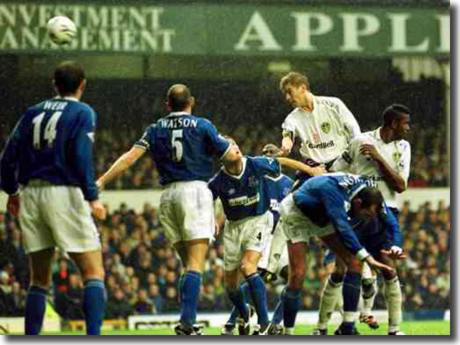 inside the area. Leeds equalised on the quarter of an hour mark after
Kewell broke down the left flank and laid on a perfect cross. Michael
Bridges slid home the ball after a miskick by Smith. Leeds then started
to dominate but shortly afterwards Woodgate and Radebe were at fault when
allowing Don Hutchinson to put Campbell through for his second goal, before
Kewell's cross somehow evaded goalkeeper Gerrard after 35 minutes to draw
Leeds level for a second time. Leeds were 3-2 down at the interval, however,
when Hutchinson fired home. 23 minutes into the second half, Darren Huckerby
unsettled the Everton defence before Bridges volleyed the ball home adroitly
for his second goal. A late header by Woodgate from a corner looked like
it had secured all three points, but an even later equaliser by Weir meant
Leeds had to settle for a thrilling 4-4 draw, but this was scintillating
stuff and a shock for fans who had got used to some pretty dull fare under
George Graham and Howard Wilkinson. Could Leeds actually be in with a
shout of the title?
inside the area. Leeds equalised on the quarter of an hour mark after
Kewell broke down the left flank and laid on a perfect cross. Michael
Bridges slid home the ball after a miskick by Smith. Leeds then started
to dominate but shortly afterwards Woodgate and Radebe were at fault when
allowing Don Hutchinson to put Campbell through for his second goal, before
Kewell's cross somehow evaded goalkeeper Gerrard after 35 minutes to draw
Leeds level for a second time. Leeds were 3-2 down at the interval, however,
when Hutchinson fired home. 23 minutes into the second half, Darren Huckerby
unsettled the Everton defence before Bridges volleyed the ball home adroitly
for his second goal. A late header by Woodgate from a corner looked like
it had secured all three points, but an even later equaliser by Weir meant
Leeds had to settle for a thrilling 4-4 draw, but this was scintillating
stuff and a shock for fans who had got used to some pretty dull fare under
George Graham and Howard Wilkinson. Could Leeds actually be in with a
shout of the title?
The winning run was a new record for the club, which took some doing
when one remembers exactly how good Don Revie's side of another generation
was. In 1969, the first championship-winning side only lost two out of
42 games, conceding just 26 goals in the process, but they never managed
to gain 10 straight victories.
In Moscow a couple of weeks later, Leeds finished off the job they had
started against Locomotiv at Elland Road and booked their place in the
third round of the UEFA Cup after their young guns turned on the style
to dismantle the Russians 3-0 on the night to win 7-1 on aggregate. But
it wasn't all Leeds as Locomotiv had the early pressure, with Sarkisan
and Boulykin both having chances before Ian Harte set the ball rolling
with a penalty on 16 minutes, after Harry Kewell had been brought down
in the area following a Michael Bridges flick.
A midfield combination of Lee Bowyer, Eirik Bakke and Harry Kewell tore
the Russian defence to shreds and they combined to let Bridges grab a
brace to seal the match before half time. For his first, Harte's cross
was headed back across the goal by Bowyer to Bridges, who lifted the ball
over the onrushing Nigmatoulline and then, on the stroke of half-time,
he ran onto a Bakke ball before toe-poking the ball past the hapless keeper
to seal the victory.
The early superiority meant that in the second half Leeds could afford
to go through the motions, with Bowyer being replaced to rest his injured
groin.
David O'Leary was pleased with his side's performance and must now, secretly
at least, have been beginning to believe in the quality of the team, though
he continued publicly to doubt the staying power of his 'Babies'.
'In the end we ran out miles in front. Against a side like that I was
very flattered. All credit to the players, they were fantastic,' said
O'Leary afterwards. 'It's a young team who will only get better.'
Understandably, Leeds could not keep up that level of performance and
they came back down to earth with a bang when they lost 2-0 at Wimbledon
the weekend following the Moscow trip. They were still winning games in
the Premiership after that, but they started to become tense and scrappy
affairs with the side obviously starting to feel the pressure.
They continued to be among the pace setters in the title race, however,
and on November 28, a last minute goal from Michael Bridges at Southampton
gave Leeds the win to put them top of the Premiership. United's leading
scorer took his tally to 12 for the season when he shot past Saints keeper
Paul Jones with a sensational strike from outside the area in stoppage
time, to seal victory and give United a two-point 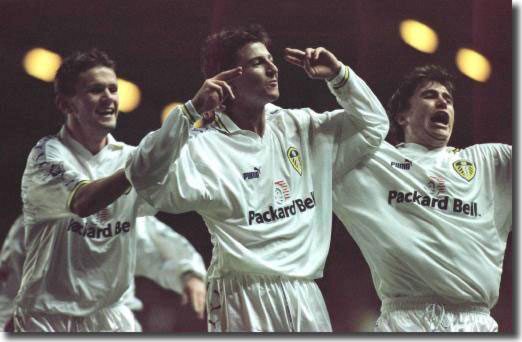 lead
at the top of the table.
lead
at the top of the table.
Four days later, Leeds came away from another trip behind the Iron Curtain,
this time against Locomotiv's Moscow rivals Spartak, with a 2-1 defeat,
but knowing that a 1-0 victory would be enough to see them through to
the last sixteen of the UEFA Cup. The match was played in Sofia in Bulgaria,
because the Russian pitch was frozen.
back to top
The Russian champions, who had failed to make the latter stages of the
Champions' League, proved much tougher opposition than their cross city
neighbours. David O'Leary indeed had to be grateful after seeing his side
take a 14th minute lead through Harry Kewell that United, who were under
the cosh for the last hour of the game, escaped with the minimum margin
of defeat. The United boss admitted after the game that his side had missed
the calming experience of David Batty in the second period.
'It's disappointing, but 2 -1 is not by any means a bad result in the
first leg, as I know we can play better. I thought we missed David Batty's
influence in the second half and we gave away two silly goals, but the
away goal stands us in good stead.'
Playing just one man up front, Leeds had started in positive fashion
and had hit the woodwork before Kewell made the breakthrough on 14 minutes,
but after that the Russians worked their way back into the game and netted
a deserved equaliser seven minutes before the break, before dominating
the second half. However, they managed only one more goal, though United
were lucky to escape as Kelly's goal-line clearance and Martyn's fine
save in the final minutes ensured the score remained unchanged.
All the travelling was starting to weary the young side and three days
later Leeds looked decidedly off colour when they visited Derby. However,
they managed to regain the top spot in the Premiership with another amazing
late show, as Ian Harte's injury time penalty gave them a deserved 1-0
win over Derby at Pride Park.
Harte coolly converted the spot kick after the impressive Harry Kewell
had been felled in the box by Horacio Carbonari. The penalty had been
hotly disputed and Derby claimed that Kewell had dived, but no one from
Elland Road was complaining and the three points put Leeds two ahead of
Manchester United.
Manager O'Leary had refused to risk David Batty in the match because
of an Achilles injury and indeed the all action midfielder did not play
again all season and feared for a while that his career might be over.
His absence, however, was 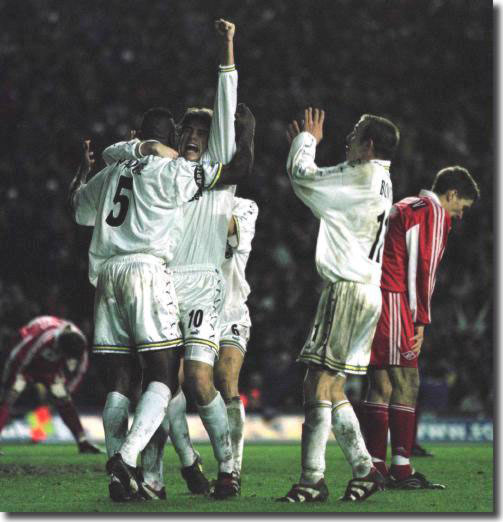 mitigated
by the form of young midfielders Eirik Bakke and Irishman Stephen McPhail
who seized their chance and made themselves regulars as the season drew
on, impressing many with their contribution and self assurance.
mitigated
by the form of young midfielders Eirik Bakke and Irishman Stephen McPhail
who seized their chance and made themselves regulars as the season drew
on, impressing many with their contribution and self assurance.
The return with Spartak was a very tense affair which went without a
goal right to the closing seconds. There were only six minutes remaining
when a corner from McPhail found Radebe, who held off his marker and headed
home from close range. Elland Road erupted and, although Leeds had still
had to endure a nervous finale, the bedlam that greeted the final whistle
was understandable.
South African international centre-back Radebe said afterwards: 'I don't
score too many goals but it's one many people will talk about. I went
in with the keeper, stuck my head in and there it was. It was a brilliant
goal and I really enjoyed it. We knew we had nothing to lose. We had to
get forward and get the first goal. We've been scoring late goals and
today we knew we had to keep going until the whistle. We take each game
as it comes. We've got a great bunch of lads and this season we set ourselves
a target to do better than last year. We have taken a step up and we will
take our chances.'
It was a night of great elation and David O'Leary's celebrations at the
end were memorable. They also showed how badly he had taken the contention
between the two sides. Spartak officials had accused Leeds of gamesmanship
and trying to take advantage of the state of the Moscow club's pitch by
arguing for a neutral venue.
A year into his managerial career, O'Leary was doing well. The team had
progressed and were carrying his distinctive stamp. That pleased him,
as did the general perception that he had taken the team forward. 'People
may not believe it now but at the time of George leaving, quite a number
of football people believed this club was going nowhere and I was taking
a no-hoper job.'
The manager's own report on his year's work was favourable, too. 'I am
pleased that I have put my team on the field, this is not simply a carry-on
of what George had here. I've gone my own way, he has gone his. When George
was manager here I would be saying, "Get Batty, he should have never
left here." I was also saying, "Woodgate is ready, blood Woodgate."
But George was his own man. He had got Derek Lilley, who was a nice lad,
but I thought we were going nowhere with Derek. Alan Smith was the future.
Then I got the job and I had the chance to do what I'd been saying. And
I'm happy that I did exactly those things.
'When I took over they said here they hoped I stabilised things; I think
we've done better than that. I have sold £16m worth of players, spent
£23m on players, and for £7m, I feel I've not done badly. I think we're
playing better football and the crowds have gone from 30,000 to 40,000.
I want people to be sitting at home saying, "Oh, Leeds are on Sky
today, they're worth watching."'
Suggesting that Leeds were missing Jimmy Floyd Hasselbaink offended him.
Hasselbaink didn't want to be part of Leeds, he didn't behave properly
and, ultimately, forfeited his right to respect. 'I don't think we've
missed Jimmy, not remotely. He wasn't a bad lad but he wasn't a team player.
He did score a lot of goals but after 17 Premiership games this season
we've scored more goals than we had after 17 games last season. You couldn't
dislike Jimmy but the way he went about leaving was a disgrace. He wouldn't
kick a ball unless he got an obscene amount of money, more than anybody
in this country is paid, including the latest Roy Keane deal. You ask
any of the players; they 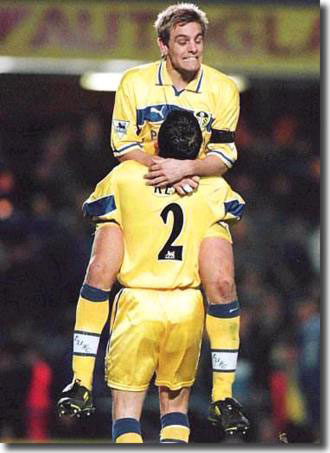 are
delighted he is gone. They have become closer as a team since he left.'
are
delighted he is gone. They have become closer as a team since he left.'
The dignified approach of O'Leary and Chairman Peter Ridsdale throughout
the Spartak episode, refusing to get drawn into a public slanging match,
won the club a lot of friends. The Russian club had been whinging like
mad throughout. Such sideshows, however, were starting to take their toll
on the side.
back to top
Radebe had had lengthy periods out of the side while he was away with
South Africa in the the African Nations Cup tournament and the form of
Lee Bowyer and Jonathan Woodgate both dipped badly following their arrest,
along with Michael Duberry and reserve striker Tony Hackworth, after drunken
incidents in Leeds city centre in January when a student was beaten up.
A malaise had descended on the players as they started to appreciate their
lofty position.
The side's form now became inconsistent - they crashed out of the Worthington
Cup on penalties to a robust Leicester side, but then pulled off a shock
2-0 win away to Chelsea with Stephen McPhail's first two goals for the
club. Jason Wilcox had arrived from Blackburn and his presence on the
left flank freed Kewell to play as an out and out striker for the rest
of the season, which saw his level of performance reach new heights. It
was a good move for Leeds, but things started to go quite badly in the
Premiership and they went through a period between December and February
when they lost 4 out of 6 games, including a 1-0 home defeat to Manchester
United, and bad beatings at rivals Liverpool and Arsenal.
Leeds had been unlucky in the game against United and deserved at least
a point against the Premiership favourites, but were unable to capitalise
on their chances while the Reds seized their own opening with Andy Cole
scoring the only goal of the game.
Disaster hit Leeds on 52 minutes after they had had the best of a tight
first half. Radebe, who looked far from fully fit, missed a ball over
the top and Cole got ahead to guide the ball over a back-peddling Nigel
Martyn into the back of the Leeds net. A minute later Keane hit the post
after the ball deflected off Nigel Martyn, a let-off for Leeds who were
rocked by the Cole strike.
Goalkeeper Mark Bosnich kept an Ian Harte free kick out, palming away
the ball as it seemed destined for the top right-hand corner and moments
later Bakke's header hit the bar, with the Reds defenders rooted to the
spot.
Then with just ten minutes remaining, Leeds missed a golden chance of
an equaliser. Wilcox took advantage of a slip by Neville, drove the ball
goalwards and as Bosnich spilled the ball, Alan Smith's shot hit the post,
rebounded to Lee Bowyer six yards out with the goal at his mercy. The
Leeds faithful waited for the ball to bulge the back of the net, but inexplicably
Bowyer blazed over to the dismay of all the United side.
O'Leary refused to be downcast afterwards, despite seeing his side fail
again against one of the top four teams. 'They are the team that I've
made favourites from day one but we're not going to give up hope,' he
vowed. 'We've got 13 games left and we're going to try to win those 13
games. We're a young emerging side learning our trade, playing against
a great side and there wasn't much in the game. They got their chance
and they took it. We got our chances and didn't take them. I know what
my side is about. We've had our little setbacks but we're a young side
doing marvellously well.'
Part 2 Tragedy in Istanbul - Results
and table













 inside the area. Leeds equalised on the quarter of an hour mark after
Kewell broke down the left flank and laid on a perfect cross. Michael
Bridges slid home the ball after a miskick by Smith. Leeds then started
to dominate but shortly afterwards Woodgate and Radebe were at fault when
allowing Don Hutchinson to put Campbell through for his second goal, before
Kewell's cross somehow evaded goalkeeper Gerrard after 35 minutes to draw
Leeds level for a second time. Leeds were 3-2 down at the interval, however,
when Hutchinson fired home. 23 minutes into the second half, Darren Huckerby
unsettled the Everton defence before Bridges volleyed the ball home adroitly
for his second goal. A late header by Woodgate from a corner looked like
it had secured all three points, but an even later equaliser by Weir meant
Leeds had to settle for a thrilling 4-4 draw, but this was scintillating
stuff and a shock for fans who had got used to some pretty dull fare under
George Graham and Howard Wilkinson. Could Leeds actually be in with a
shout of the title?
inside the area. Leeds equalised on the quarter of an hour mark after
Kewell broke down the left flank and laid on a perfect cross. Michael
Bridges slid home the ball after a miskick by Smith. Leeds then started
to dominate but shortly afterwards Woodgate and Radebe were at fault when
allowing Don Hutchinson to put Campbell through for his second goal, before
Kewell's cross somehow evaded goalkeeper Gerrard after 35 minutes to draw
Leeds level for a second time. Leeds were 3-2 down at the interval, however,
when Hutchinson fired home. 23 minutes into the second half, Darren Huckerby
unsettled the Everton defence before Bridges volleyed the ball home adroitly
for his second goal. A late header by Woodgate from a corner looked like
it had secured all three points, but an even later equaliser by Weir meant
Leeds had to settle for a thrilling 4-4 draw, but this was scintillating
stuff and a shock for fans who had got used to some pretty dull fare under
George Graham and Howard Wilkinson. Could Leeds actually be in with a
shout of the title? lead
at the top of the table.
lead
at the top of the table. mitigated
by the form of young midfielders Eirik Bakke and Irishman Stephen McPhail
who seized their chance and made themselves regulars as the season drew
on, impressing many with their contribution and self assurance.
mitigated
by the form of young midfielders Eirik Bakke and Irishman Stephen McPhail
who seized their chance and made themselves regulars as the season drew
on, impressing many with their contribution and self assurance. are
delighted he is gone. They have become closer as a team since he left.'
are
delighted he is gone. They have become closer as a team since he left.'